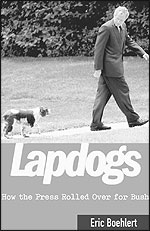Few leading news organizations or well-known Washington journalists come off unscathed in this grim account of the news media's record during the last few years. Starting with the year 2000 and going through 2005, Eric Boehlert tracks the heavy hitters' coverage of George W. Bush and finds it lacking and them, often, lackeys.
"The goal of 'Lapdogs,'" Boehlert writes in his preface, "is to cut through incessant rhetoric about a liberal media bias, and to show, factually, just how the mainstream media has tipped the scales in President Bush's favor for going on six years .... the conclusion — that the press rolled over for Bush — [is] inescapable."
During this period, Boehlert wrote essays about the news media for the online publication Salon.com; now he is a contributor to The Huffington Post and a contributing editor to Rolling Stone. Having dozens of his own news articles and essays to work from enabled him to go back, easily, and revisit just about every press misjudgment, foible, stupidity, bias and kowtow that he captured along the way.
My impression is that his Salon reports, which he describes as the "foundation" of "Lapdogs," must have focused on the failures of editors and reporters and very rarely, if at all, on worthwhile accomplishments. Thus, chapter after chapter of his book consists of negative accounts of the work of well-known TV and newspaper figures who often are highly respected, even venerated, elsewhere. The book would have been a little less jarring had Boehlert reached out a bit. But that's not what he had in mind, and so be it. Authors are entitled to their approach, and Boehlert is scrupulous in documenting his many assertions.
Among those criticized to one extent or another are Ted Koppel, Chris Matthews, Bob Woodward, Wolf Blitzer, Nicholas Kristof, Bob Schieffer, Leonard Downie, Jr., David Westin, Katie Couric, David Broder, Tim Russert, Charlie Gibson, the late Peter Jennings, Howard Kurtz, Bill Keller, Newsweek, Time, The New York Times, and The Washington Post. Each is left somewhat scarred by Boehlert's knife.
Regarding Koppel, Boehlert writes about a certain affinity he has shown for secretaries of state: "'We are lucky to have had you,' Koppel phoned to tell Henry Kissinger as he prepared to leave office following the GOP election loss in 1976, and just years after Kissinger helped oversee the U.S. bombing of Laos and Cambodia which killed nearly one million civilians."
About the friendship between Koppel and Colin Powell, he writes that Powell sat for three in-depth "Nightline" interviews in the 13 months after the invasion of Iraq. They occasionally talked on air about Powell's health and the Washington Redskins football team. But "during Powell's first 'Nightline' interview, October 31, 2003, he was not asked one question about his U.N. performance [a month before the Iraq war] despite the fact that observers had already detailed the obvious errors in Powell's presentation. In fact it took the international press just one week to detail the holes in Powell's speech. But eight months later on 'Nightline,' Koppel paid no attention to that fact."
Boehlert takes a look at some of the dialogue between Chris Matthews and George W. Bush in a 2000 interview. This conversation took place seven days after The Boston Globe had revealed that Bush had fallen off the Air National Guard's radar for months at a time between 1972 and 1973. It was well known, too, that Ben Barnes [former speaker of the Texas house] had testified under oath a year earlier that he'd placed a call in 1968 in order to help get Bush a coveted slot in the Texas Air National Guard. Yet Matthews refused to raise any uncomfortable questions for Bush about Vietnam:
Matthews: Let me ask you about Vietnam and your service. You were in the Air National Guard. You took a lot of — and I will give you credit. It takes a lot of guts to get in a jet plane and fly it. I mean, I don't think anybody ought to knock that.
Governor Bush: Thank you.
Matthews went on to ask Bush if, in retrospect, the draft system during Vietnam was unfair.
Matthews: Do you ever feel like, damn it, what an awful system to put some guys at risk and other guys not?
Governor Bush: No. You know what I felt? I felt like what a bad war, that we didn't fight the war to win. And the lessons from this generation ought to be not to commit troops to win a war .... (Applause)
As for Bob Schieffer, Boehlert finds more than a little cronyism, noting that he used to play golf and go to baseball spring training with Bush; that Schieffer's brother was a business partner of Bush's as president of the Texas Rangers baseball team; that Bush appointed the brother as ambassador to Australia and then Japan. "Immediately following his reelection as governor of Texas in 1998, Bush was inundated with interview requests from the national media, curious about his political ambitions. Bush turned them all down, but one," Schieffer on "Face the Nation." Boehlert also notes that in his 2004 book about his Sunday morning news show, Schieffer told of congratulating Bush, letting him know that "he had said exactly what needed to be said" in an interview on the eve of the 2000 New Hampshire primary.
Given Boehlert's evidence, it does seem as though Koppel, Matthews and Schieffer were a little too close and comfortable, not at all adversarial — and not then able to represent the public's interest, as journalists should. That is Boehlert's basic charge, one he makes time and again — and quite effectively — against so many stalwarts of the Washington press corps.
How the Press Responded
It can be easy to forget some of the Bush administration's gross and numerous missteps, but Boehlert reminds us of many while providing plenty of examples of feeble news coverage. What should have been a two- or three-day story, the vicious "swift boat" attacks on presidential candidate John Kerry, were paid for by major, longtime Texas backers of Bush. Then, with cable TV outlets leading the way and the more traditional news organizations close behind, the allegations came to dominate election coverage to the exclusion of other, more important and legitimate stories. As Boehlert put it, "The press spooked about being tagged as too liberal, played dumb on an unprecedented scale, much to the White House's delight."
One of the worst cases Boehlert explores — a news media forfeit, one could call it — is the bumbling coverage of the Valerie Plame/Joseph Wilson/Niger aluminum tubes/defective Senate Intelligence Committee inquiry of prewar behavior by Bush and others in the White House. In essence, these events all meld into one story, with the underlying issue being whether Bush knowingly hyped or twisted phony intelligence reports to gain public support for the war. That is no small issue, but readers and viewers couldn't tell it from much of the news coverage, not even to this day. Boehlert notes that as late as July 2005, ABC's "Nightline" reported that "for two years it has been unknown who told reporters the identity of Valerie Plame." The fact is, however, as he shows, at least 10 Washington reporters did know, but none either broke the story or advanced it in any way.
Other examples of poorly covered news events that Boehlert writes about can make one shudder. They include:
- The run-up to the Iraq War, Abu Ghraib, and Secretary of Defense Donald Rumsfeld
- Halliburton, false estimates of the costs of the Iraq War
- Vice President Dick Cheney, including his hunting accident
- Guantanamo Bay
- The Terri Schiavo case
- Jack Abramoff and political corruption
- Hurricane Katrina and its clean-up
- Stem cell research restrictions
- Forays against Social Security and tax benefits for the wealthy
- Replacing Bill Moyers and weakening the Corporation for Public Broadcasting.
An important criticism Boehlert makes falls into the "you can't criticize Republicans without also criticizing Democrats" department of so-called balanced news coverage, and it played out flagrantly in coverage of the Abramoff case. In Boehlert's words, here is what happened:
"In January 2006, when Newsweek wrote up the indictments of Jack Abramoff, the GOP kingpin lobbyist, the magazine's headline read: 'A Washington Tidal Wave: Members of Congress rushed to give back money,' suggesting the influence peddling scandal was a bipartisan 'Washington' problem. The Newsweek article stressed the public would likely 'remain appropriately skeptical of both parties.' [Emphasis added.] Time used the same kid glove approach: 'Jack Abramoff built a power network using the rich and naive. Washington may pay the price.' [Emphasis added.] The Washington Post falsely reported Abramoff had 'made substantial campaign contributions to both major parties,' and NBC's Katie Couric insisted, 'Democrats took money ... from Jack Abramoff, too.' All four MSM organizations dutifully mouthed GOP spin about a bipartisan scandal and ignored the plain fact that not one Democrat had accepted tainted contributions from Abramoff, not one Democrat had been indicted, and not one Democrat was under investigation for accepting Abramoff money."
Boehlert refreshes our memory, too, about some of the Bush administration's crude and malicious manipulations to undermine press credibility. In each instance, two key elements were intertwined: treachery or highly questionable decisions by those in power (more often treachery) and a weak, often lapdog response by the news media. About this Boehlert writes:
"All sorts of extraordinary press initiatives, like producing phony, look-alike newscasts to run on local television stations, paying pundits to hype White House initiatives, severely restricting the government's public flow of information, sponsoring a partisan crusade against public television, prosecuting journalists, and giving special White House press privileges to a former GOP male escort who was waved into the Bush White House — minus the FBI background check — while volunteering for a right-wing propaganda Web site."
What was the press's response? "In five-plus years the press failed again and again to assert itself and hold the administration accountable," Boehlert concludes. If what he argues and presents as evidence suggests that the press never asserted itself, then it's an exaggeration. But unfortunately, it's not much of one.
Barry Sussman is editor of the Nieman Foundation's Watchdog Project and the Web site, www.niemanwatchdog.org




